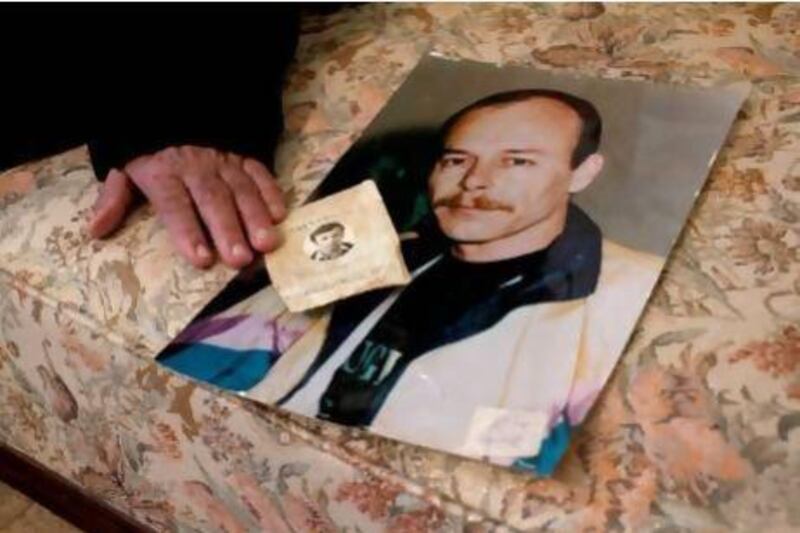ARA, ISRAEL // For the Palestinians who learned this week that their loved ones would finally be freed from an Israeli jail cell, there was an overwhelming combination of joy and relief.
For others such as Widad Younis, however, there was the dreaded opposite - despair and emptiness - when Israel early Monday released the list of 26 prisoners it would release as part of a US-backed agreement to restart Middle East peace negotiations.
Again, as in past announcements of prisoner releases, the name of her 54-year-old son, Maher, was absent from the list.
Now her son's fate feels just as uncertain as it did when he was convicted of murder in an Israeli court three decades ago, she said.
"My life has been nothing but pain and exhaustion since then," Mrs Younis, 78, said during an interview this week from the family's home in Ara, an Israeli Arab village located about 75 kilometres north of Jerusalem.
"All we want is to have him back home."
Maher is one of 104 so-called security prisoners that Israel has tentatively agreed to release in four phases over the nine-month deadline that the US secretary of state, John Kerry, set last month for Israeli and Palestinian leaders to conclude a peace deal.
Jailed since before the signing of the 1993 Oslo peace accords, most of these prisoners are Palestinians from the occupied territories who have been convicted for killing Israelis. The majority of those scheduled for release yesterday have served most of their sentences, according to Palestinian rights group.
Like many other security prisoners, Maher was captured and sent to jail after he killed an Israeli.
In 1981 he and two relatives shot dead Avraham Bromberg, an Israeli soldier whom Maher knew from secondary school. Arrested two years after the killing, Maher was given a life sentence that was reduced last year to 40 years after his family's successful appeal for leniency to Israel's High Court of Justice.
Maher's family declined to discuss his motivation for conspiring in the attack. But they expressed bitterness about those who asked him to carry it out - officials in the Palestine Liberation Organisation (PLO), they said, many of whom now serve in positions of power in the West Bank's Palestinian Authority.
"People like Maher were used like pawns, and then they were left with all the blame and the suffering," Mrs Younis said after remarking that PLO members caught up in violence against Israelis very rarely, if ever, have been forced to serve jail sentences as long as her son's.
Coupled with this frustration, the family cited another potential obstacle to Maher's release: their Israeli citizenship.
Neither Maher nor any of the other 13 Palestinian-Arab citizens of Israel among the prisoners to be set free over the next nine months appeared on the list of 26 inmates scheduled to be released yesterday, which has aroused not just the suspicions of the Younis family.
"I think this issue is something that has to do with political reasons," said Sahar Francis, director the Addameer Prisoner Society, a Jerusalem-based, non-governmental organisation that focuses on Palestinian prisoners.
"In previous exchanges, Israeli leaders released prisoners who were Israeli citizens."
That includes Sami Younis, 84, who was convicted for ordering Maher and his cousin, Karim, to kill Bromberg back in 1981.
Younis, a long-time member of the PLO, was released two years ago as part of the 1,027 prisoners exchanged for an Israeli soldier, Gilad Shalit, who was held for over five years by the Palestinian Hamas movement that runs the Gaza Strip.
Israeli officials reportedly have been reluctant to negotiate the release of Arab citizens with the PLO, which does not have any remit inside Israel.
Writing last month in the Al Monitor news website, Shlomi Eldar, an Israeli journalist, reported that public opposition in Israel to setting free prisoners implicated in attacking Israelis also persuaded Benjamin Netanyahu, the prime minister, and his cabinet to exclude Arab citizens in today's release.
For Maher's older brother, Nader, 58, a businessman in Ara, this issue not only has raised concern that their release may never happen. It also has aggravated long-standing grievances concerning racism.
Nader criticised the treatment of his brother and other Arab citizens of Israel who are imprisoned under security-related circumstances. He alleged that they are denied the right to phone calls, emergency family visits and other privileges afforded Jewish prisoners such as Ami Popper, who murdered seven Arabs in 1990 at a bus stop in the Israeli city of Rishon LeZion.
"Even in prison, we're discriminated against," said Nader, who ticked off a litany of complaints about Israel's institutionalised discrimination of its Arab citizens.
But for Maher's mother, all other issues are secondary to having him home again.
"Every era in history is defined by certain characteristics, and the era we live in now is one where we are trying to negotiate peace instead of fighting," she said. "So why don't we promote peace by letting me have my son back?
"I'm already an old woman who was forced to watch her son grow old in a jail cell."
hnaylor@thenational.ae
twitter: For breaking news from the Gulf, the Middle East and around the globe follow The National World. Follow us





